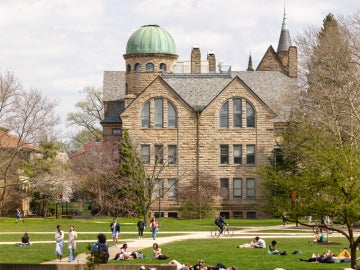Two awarded summer research opportunity with Howard Hughes Medical Institute
May 25, 2016
Amanda Nagy

The Oberlin College Science Center.
Photo credit: Matthew Lester
Rising fourth-years Bradley Hamilton and Jennifer Jimenez will spend the summer doing cutting-edge research with scientists whose work is funded by the Howard Hughes Medical Institute (HMMI).
Both were accepted into the HMMI Exceptional Research Opportunities Program (EXROP), which provides 10 weeks of full-time research in the lab of an HHMI investigator who has volunteered to provide mentored research experiences, as well as a $5,000 award and funding for long-distance travel and housing expenses.
The program links the resources of HHMI scientists with motivated undergraduates from disadvantaged backgrounds and groups traditionally underrepresented in the sciences with outstanding summer research experiences. HHMI continues to work with EXROP students after their summer study programs to encourage them to pursue careers in academic science.
Hamilton, a neuroscience major and East Asian studies minor, will work with Alex Kolodkin at Johns Hopkins University, while Jimenez, a biology major and chemistry minor, will collaborate with David Ginsburg at the University of Michigan.
Kolodkin’s lab focuses on discovering and isolating the chemical signals that modulate retinal nerve regeneration.
“The hope is that if these signals are better understood, all sorts of medical conditions can eventually be treated,” Hamilton explains. “Some examples are paralysis due to spinal injury and blindness due to damaged retinal nerves.”
Hamilton, a year-round runner in cross country and track from Clemson, South Carolina, says most of his research at Oberlin has involved known compounds, but the HHMI experience will equip him with the ability to look for unknowns. “To me, this is the essence of science—we have a goal in mind and little information about how to reach it. I’m sure that many things we try in the lab will be unsuccessful, but much of this is about trying repeatedly until something finally works.”
An aspiring neurosurgeon, he also anticipates gaining technical skills through compound isolation and fluorescence labeling. “Due to the nature of my specific research, I will need to become an expert on retinal-brain connection anatomy.”
He says the opportunity to move out of the classroom laboratory and into a professional setting is exhilarating. “The research I am pursuing has the potential for becoming medically relevant in my lifetime, and that is incredibly motivating to me.”
At the University of Michigan, Jimenez will be part of an investigation of the components of the mammalian blood-clotting system and the genetics behind disorders such as hemophilia. She says her project will focus on the role of the COPII secretory pathway in hematologic diseases by using the genome-editing technology known as CRISPR to modify COPII genes in human cell lines.
“I am very interested in studying the genetics underlying genetic disorders, which is why I am particularly excited about being exposed to new techniques, such as the new CRISPR technology. I am looking forward to working in a highly medically oriented lab, as Dr. Ginsburg is a practicing physician and treats patients for many of the disorders he also studies.”
In summer 2015, Jimenez was selected to participate in the Amgen Foundation’s prestigious Amgen Scholars Program, in which she spent 10 weeks conducting hands-on, cutting edge research at the National Institutes of Health (NIH). The previous summer, she interned with Richard Lenski ’76, professor of microbial biology at Michigan State University. She has also interned at the NIH in Dr. Nigel Crawford’s lab as part of the National Human Genome Institute.
“I feel very fortunate to have received such an incredible research opportunity as an undergraduate,” say Jimenez, who is from Okemos, Michigan. Summer programs such as EXROP allow you to fully immerse yourself in an independent project, all while connecting with other undergraduates who have similar interests from school across the country. It also gives you a better perspective on the possibilities after graduation.”
Hamilton adds, “Beyond all of the personally gratifying aspects, conducting research for extended periods of time is among the most important criteria for acceptance into a PhD program.”
You may also like…
Oberlin Launches Critical AI Studies Minor in Fall 2026
With a solid foundation in both science and the humanities, this minor ensures students to understand and be able to analyze the ethical, cultural, environmental, political, economic, technological, and labor effects of AI.
Chudi Martin Jr. ’24 Earns Prestigious Gates Cambridge Scholarship
Chudi Martin Jr. ’24 earns prestigious Gates Cambridge Scholarship.
Oberlin Named a Top Producer of Fulbright Students for 2025-26
Oberlin College and Conservatory was named a Top Producer of Fulbright students for the 2025-2026 academic year.


